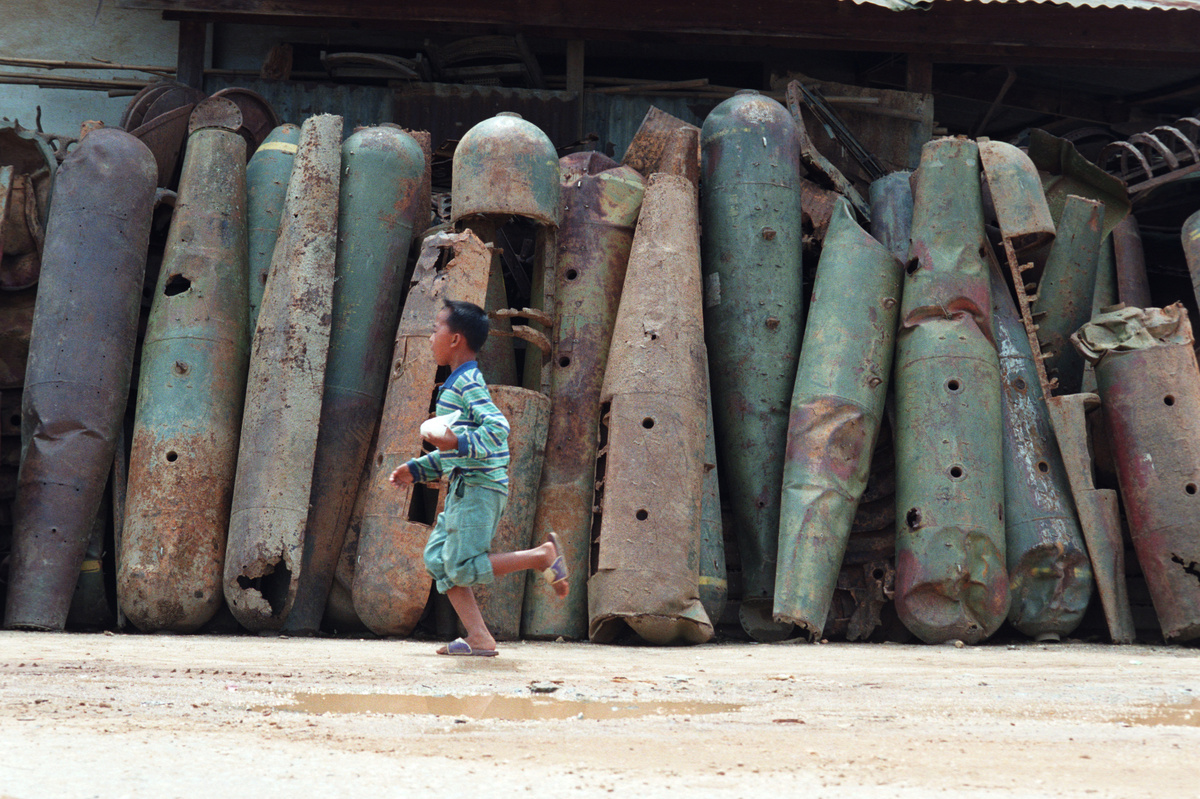A man walks past an unexploded tail section of a 300mm rocket which appear to contained cluster bombs launched from a BM-30 Smerch multiple rocket launcher embedded in the ground after shelling in Lysychansk, Lugansk region on April 11, 2022.
Anatolii Stepanov/AFP via Getty Images
hide caption
toggle caption
Anatolii Stepanov/AFP via Getty Images


A man walks past an unexploded tail section of a 300mm rocket which appear to contained cluster bombs launched from a BM-30 Smerch multiple rocket launcher embedded in the ground after shelling in Lysychansk, Lugansk region on April 11, 2022.
Anatolii Stepanov/AFP via Getty Images
The United States is supplying cluster munitions to Ukraine to help defend its territory against Russia, despite concerns from human rights groups that the deployment of such weapons endangers civilians.
Speaking at the Pentagon on Friday, Colin Kahl, undersecretary of defense for policy, announced a new drawdown of $800 million in military assistance, including DPICMS or cluster bombs.
U.S. officials maintained that Ukraine has provided written assurances to minimize civilian casualties with the use of the controversial munitions as human rights groups stress that the weapons drop dozens of bomblets that endanger civilians. Cluster bombs release a larger number of bomblets over a wide area, and they can continue to pose a deadly risk long after the fighting has ended.
More than one hundred countries ban such weapons because unexploded bomblets can be picked up by civilians, causing injury or death.
NPR first learned of the plan to send cluster bombs to Ukraine earlier this week.
President Biden told CNN in an exclusive interview that the decision to send Ukraine cluster munitions was “very difficult.”
“And by the way, I discussed this with our allies, I discussed this with our friends up on the Hill,” Biden said, according to CNN. “The Ukrainians are running out of ammunition.”
Biden’s national security adviser Jake Sullivan told reporters at the White House that Ukraine needs cluster munitions as a “bridge of supplies” as the U.S. works to ramp up production of other types of artillery to supply to Ukraine.
“We will not leave Ukraine defenseless at any point in this conflict, period,” Sullivan said.


A boy runs past rusted halves of cluster bomb shells and other military hardware in a scrap metal shop along the main street in Phonsavanh, Laos on August 1, 1998.
Jerry Redfern/LightRocket via Getty Images
hide caption
toggle caption
Jerry Redfern/LightRocket via Getty Images


A boy runs past rusted halves of cluster bomb shells and other military hardware in a scrap metal shop along the main street in Phonsavanh, Laos on August 1, 1998.
Jerry Redfern/LightRocket via Getty Images
Sullivan said the United States held off on supplying the munitions as it weighed the risk to civilians, and consulted with allies about the decision.
He said Russia has been using cluster munitions to attack Ukraine, meaning that the United States will need to help Ukraine with post-conflict demining in any scenario. Sullivan said Ukraine is motivated to use the weapons in a way that minimizes risk to its citizens, and has also formally agreed to use them carefully.
Humanitarian groups warn against their danger to civilians
More than 120 countries have agreed to a 2008 United Nations treaty banning their use. The U.S., Russia and Ukraine are not among them.
Ahead of the announcement, Sera Koulabdara of the U.S. Campaign to Ban Landmines and Cluster Munition Coalition described cluster munitions as “horrific.”
“Once they’re scattered, they’re scattered through a vast amount of areas, and they have very, very high failure rates,” Koulabdara told Morning Edition. “Once they’re dropped, they’ll continue to impact civilian lives for decades to come, as well as, killing civilians today.”
Koulabdara urged Ukrainian and U.S. leaders “to look at history and for the United States of America, our own history in countries like Laos, Cambodia, Vietnam, Afghanistan [and] Iraq.
“You learn from the impacts and the legacies of wars that this will have on human lives,” Koulabdara said, “lives of civilians who have a name, who have mothers, who have fathers who cares about them.”
This story originally appeared on NPR

